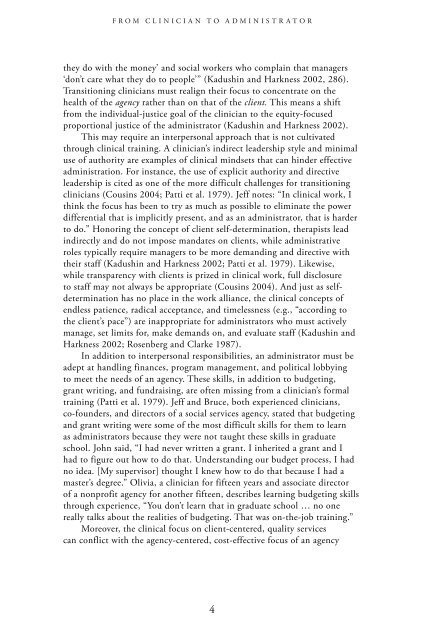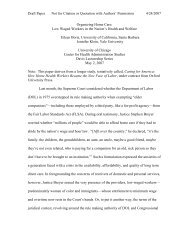DEFINING PROBLEMS. SHAPING SOLUTIONS . - School of Social Service ...
DEFINING PROBLEMS. SHAPING SOLUTIONS . - School of Social Service ...
DEFINING PROBLEMS. SHAPING SOLUTIONS . - School of Social Service ...
You also want an ePaper? Increase the reach of your titles
YUMPU automatically turns print PDFs into web optimized ePapers that Google loves.
F R O M C L I N I C I A N T O A D M I N I S T R A T O R<br />
they do with the money’ and social workers who complain that managers<br />
‘don’t care what they do to people’” (Kadushin and Harkness 2002, 286).<br />
Transitioning clinicians must realign their focus to concentrate on the<br />
health <strong>of</strong> the agency rather than on that <strong>of</strong> the client. This means a shift<br />
from the individual-justice goal <strong>of</strong> the clinician to the equity-focused<br />
proportional justice <strong>of</strong> the administrator (Kadushin and Harkness 2002).<br />
This may require an interpersonal approach that is not cultivated<br />
through clinical training. A clinician’s indirect leadership style and minimal<br />
use <strong>of</strong> authority are examples <strong>of</strong> clinical mindsets that can hinder effective<br />
administration. For instance, the use <strong>of</strong> explicit authority and directive<br />
leadership is cited as one <strong>of</strong> the more difficult challenges for transitioning<br />
clinicians (Cousins 2004; Patti et al. 1979). Jeff notes: “In clinical work, I<br />
think the focus has been to try as much as possible to eliminate the power<br />
differential that is implicitly present, and as an administrator, that is harder<br />
to do.” Honoring the concept <strong>of</strong> client self-determination, therapists lead<br />
indirectly and do not impose mandates on clients, while administrative<br />
roles typically require managers to be more demanding and directive with<br />
their staff (Kadushin and Harkness 2002; Patti et al. 1979). Likewise,<br />
while transparency with clients is prized in clinical work, full disclosure<br />
to staff may not always be appropriate (Cousins 2004). And just as selfdetermination<br />
has no place in the work alliance, the clinical concepts <strong>of</strong><br />
endless patience, radical acceptance, and timelessness (e.g., “according to<br />
the client’s pace”) are inappropriate for administrators who must actively<br />
manage, set limits for, make demands on, and evaluate staff (Kadushin and<br />
Harkness 2002; Rosenberg and Clarke 1987).<br />
In addition to interpersonal responsibilities, an administrator must be<br />
adept at handling finances, program management, and political lobbying<br />
to meet the needs <strong>of</strong> an agency. These skills, in addition to budgeting,<br />
grant writing, and fundraising, are <strong>of</strong>ten missing from a clinician’s formal<br />
training (Patti et al. 1979). Jeff and Bruce, both experienced clinicians,<br />
co-founders, and directors <strong>of</strong> a social services agency, stated that budgeting<br />
and grant writing were some <strong>of</strong> the most difficult skills for them to learn<br />
as administrators because they were not taught these skills in graduate<br />
school. John said, “I had never written a grant. I inherited a grant and I<br />
had to figure out how to do that. Understanding our budget process, I had<br />
no idea. [My supervisor] thought I knew how to do that because I had a<br />
master’s degree.” Olivia, a clinician for fifteen years and associate director<br />
<strong>of</strong> a nonpr<strong>of</strong>it agency for another fifteen, describes learning budgeting skills<br />
through experience, “You don’t learn that in graduate school … no one<br />
really talks about the realities <strong>of</strong> budgeting. That was on-the-job training.”<br />
Moreover, the clinical focus on client-centered, quality services<br />
can conflict with the agency-centered, cost-effective focus <strong>of</strong> an agency<br />
4
















